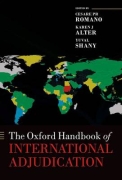| |||||
• polskie
• Zamów informacje o nowościach z wybranego tematu • kontakt |
THE OXFORD HANDBOOK OF INTERNATIONAL ADJUDICATIONALTER K. SHANY Y. ROMANO C.P.R.wydawnictwo: OXFORD UNIVERSITY, 2014, wydanie Icena netto: The Oxford Handbook of International AdjudicationThe post Cold War proliferation of international adjudicatory bodies and international adjudication has had dramatic effects on both international law and politics, greatly affecting international relations, particularly economic relations, the enforcement of human rights, and the criminal pursuit of perpetrators of mass atrocities. International courts and tribunals have become, in some respects, the lynchpin of the modern international legal system. The Oxford Handbook of International Adjudication uniquely brings together analysis of the legal, philosophical, ethical and political considerations brought about by these bodies. It provides an original and comprehensive understanding of the various forms of international adjudication. A series of cross-cutting chapters overview key issues in the field, both theoretical and practical, providing scholars, students, and practitioners with a detailed understanding of important legal and political influences within the international adjudicative process. The Handbook is divided into six parts. PART 1: MAPPING INTERNATIONAL ADJUDICATION ; 1. Mapping International Courts and Tribunals, the Issues and Players ; 2. Illustrations: A Reader's Guide ; 3. The Origins of International Adjudication ; 4. Contemporary International Adjudicators: Evolution and Multiplication ; 5. Trial and Error in International Judicialization ; 6. The Shadow Zones in International Judicialization ; 7. The Challenge of Proliferation: Legal & Normative Debates About International Adjudication ; PART 2: ORDERS AND FAMILIES OF INTERNATIONAL ADJUDICATORS ; 8. The Main Functions of International Adjudicators ; 9. International Courts and Tribunals for Inter-State Disputes ; 10. Criminal Courts ; 11. Human Rights Courts ; 12. Courts of Regional Economic and Political Integration Agreements ; 13. Administrative Tribunals ; 14. International Claims and Compensation Bodies ; 15. Arbitration of Investment Disputes ; PART 3: THEORETICAL APPROACHES TO STUDYING INTERNATIONAL ADJUDICATION ; 16. Transnational Legal Process Theories ; 17. Political Science Theories ; 18. Sociological Approaches ; 19. Trustees of International Law? Philosophical Queries of the Proper Role of International Courts ; PART 4: CRUCIAL ISSUES IN CONTEMPORARY INTERNATIONAL ADJUDICATION ; 20. Conversations among Courts: International and Domestic Adjudicators ; 21. Effectiveness of International Adjudicators ; 22. Enforcement / Compliance with Decisions and Provisional Measures ; 23. International Judicial Behavior ; 24. Political Constraints ; 25. Who Litigates? ; 26. Judgments and Decisions: The Making of International Law by International Courts and Tribunals ; PART 5: KEY ACTORS ; 27. The International Judge ; 28. The International Litigators ; 29. The International Bar ; 30. International Criminal Prosecutors ; 31. Defense Counsels in International Criminal Courts ; 32. Legal Secretariats, Registry and Staff ; PART 6: SELECTED LEGAL AND PROCEDURAL ISSUES OF INTERNATIONAL ADJUDICATION ; 33. Election and Selection of Judges ; 34. Judicial Ethics ; 35. Jurisdiction and Admissibility ; 36. Third Parties (Including Victims' Rights) ; 37. Evidence, Fact-Finding, and Experts ; 38. Inherent Powers ; 39. Remedies ; 40. Financing 1072 pages, Hardcover Księgarnia nie działa. Nie odpowiadamy na pytania i nie realizujemy zamówien. Do odwolania !. |


